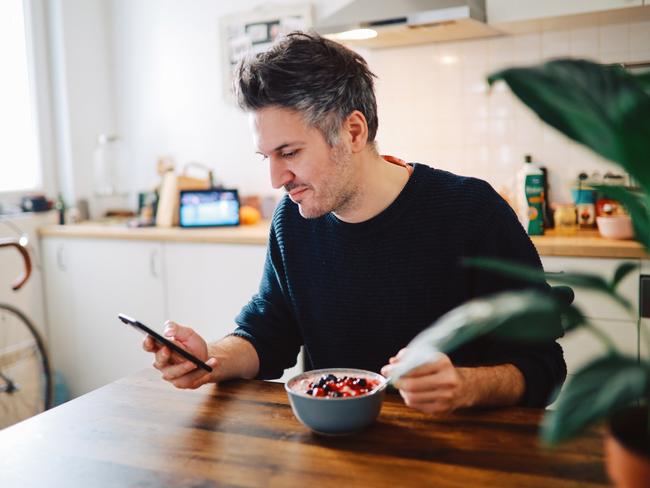14 ways to help you lose weight without drugs
With a change in mindset lasting weight loss is achievable, according to researchers at Oxford and Cambridge. Here’s where to start.

An extra few glasses of rose or a few Easter eggs too many may have stopped your weight-loss goals in their tracks, but don’t allow that to cause your motivation to flag. That is the message from Dr Amy Aherne, a researcher in the prevention of obesity at the University of Cambridge Medical Research Council (MRC) Epidemiology Unit, and her colleagues, who have spent decades researching the small lifestyle changes that make a difference to our weight.
Even those using appetite-suppressing jabs such as Ozempic and Wegovy need a similar mindset, Aherne says. Such drugs may have helped people to lose up to 20 per cent of their body weight but, she says, they “are not a silver bullet” in the long term. “We know that 71 per cent of people who use weight-loss medications stop taking them within a year because of side-effects such as nausea and a cost of up to pounds 300 a month if you pay for them privately,” Aherne says. “When people do stop taking them, there is a sharp increase in appetite and weight regain is rapid.”
All dieters, she says, will benefit from implementing tricks and strategies that help them to keep extra pounds at bay, and researchers at the universities of Oxford and Cambridge are at the forefront of finding out precisely what makes them tick. “Everyday behavioural techniques are much more effective than people think,” Aherne says. “There are so many simple things that you can do to make weight loss and maintenance that bit easier.” She and her colleagues recently found that a four-month digital self-help program providing tips for weight-loss maintenance was more effective at helping people keep off the kilos at three and six months than providing them with a standard weight-loss leaflet.
Findings from that initial trial were published in the journal Obesity Science and Practice and the team are recruiting for a large, randomised control trial of 18,000 people that Aherne hopes will also help people to lose weight and prevent them from developing conditions including type 2 diabetes.
“People are three times more likely to achieve a weight-loss goal if they make a specific plan of when, where and how they plan to achieve it,” Aherne says. “That, along with behavioural strategies, can help you succeed.”
So what are the tips and tweaks that the Oxbridge scientists have found to be most effective?
1. Any diet will work if you can stick to it
All diets work in a similar way, Aherne says, by focusing attention on how and what you are eating. Some are designed to limit the amount of time you spend eating (like time-restricted or intermittent fasting approaches), while others focus on reducing the sorts of food you eat (high-protein, low-calorie diets). Regardless of the diet plan, they all result in you taking in fewer calories than you are used to eating. “The best diet is the one that you can stick to,” Aherne says. “If one of the trendy diets supplies the nutrients needed to stay healthy and happens to work for your lifestyle, then do it.”
2. Front-load your calories

Avoiding breakfast has become a popular diet strategy for intermittent fasters, but it won’t work for all of us. Indeed, one study of 6764 midlifers by Cambridge scientists showed that those who consumed 22 to 50 per cent of their daily calories in the morning had the lowest BMI compared with people who consumed only up to 10 per cent of daily calories first thing. In general, front-loading your calories is a good idea. “We found that people who eat more of their calories early in the day have less weight gain,” says Professor Nick Wareham, the director of the MRC Epidemiology Unit and researcher in the prevention of obesity at the University of Cambridge. “Breakfast or an early meal gives the body time to metabolise calories more efficiently.”
3. Reducing stress will help you to conquer cravings
Low mood, stress and anxiety can all hamper your weight loss. “We know that stress and low mood cause biochemical changes in hormones that regulate hunger so that we want to eat more,” Aherne says.
Researchers at the University of Cambridge asked 2133 overweight adults to record personal data about mood and weight for 6 to 9 months as part of a study published in the PLOS One journal last year.
When they examined the data they found that each time a participant scored symptoms of anxiety and stress one increment higher than usual on a mobile app where they also logged their weight, they gained 45g in weight a month later.
Although this seems a tiny weight gain, the researchers explained that for those whose stress and anxiety score rose from five to ten (equal to an increase from “mild” to “moderate” stress or depression), it could mean an average weight gain of 225g, or half a pound.
“Even small weight changes occurring over short periods of time can lead to larger weight changes in the long term,” says Dr Julia Mueller, a researcher in the MRC Epidemiology Unit at Cambridge.
4. Surf the urge to snack
What if you do have a seemingly irresistible food craving? Urge surfing is a mindfulness technique used to help people to cope with food cravings that has been used successfully in recent studies by Aherne and her colleagues. “People are taught to ‘surf the urge’ when they have a strong craving by watching the craving rise and fall without attempting to get rid of it by indulging in the food,” she says. “It can be hugely powerful.”
5. Chew sugar-free gum
In one study, chewing gum was found to inhibit snacking by about 10 per cent. It’s a strategy recommended by the Oxford team who say that chewing sugar-free gum until a craving passes is a way of distracting yourself by focusing on something else.
6. Plan a route to work that avoids food outlets
The number of fast food outlets and cafes serving muffins and pastries you are exposed to on your commute or near your home correlates highly with overconsumption of takeaway foods and calories. “Our food environment has a big influence on what we eat,” Wareham says. “On average, people in our studies passed up to 32 food outlets on their way to work, but some passed as many as 165, and the higher the number they passed, the greater the risk of weight gain and obesity.”
7. Try not to eat after 8pm
Avoiding food after 8pm and ensuring any drinks you consume during the evenings are low or no-calorie is one of the strategies outlined for successful weight loss by Oxford scientists in their Oxford Food and Activity Behaviours (OxFAB) study. In short, you are more prone to snack impulsively on crisps, wine and beer during the evening, so rule it out.
8. Download an app such as MyFitnessPal or Noom

Tracking your calorie intake and physical activity levels is essential, especially in the early stages of a weight-loss plan. “A period of self-monitoring helps you to understand specific patterns of behaviour and how that relates to changes in your body weight,” Aherne says. “Recording these things also helps you to reflect on which strategies are working and which you might need to revise.”
A basic diary is fine, but according to Susan Jebb, a professor of diet and population health at the University of Oxford, apps are the way many dieters now prefer to track everything from what they have eaten to how many steps they’ve done in a day.
In one of her studies, Jebb and her colleagues asked 50 dieters to use a weight-tracking app and complete daily and weekly questionnaires about their food and activity levels. A control group of 50 did none of these things, although both groups weighed themselves daily. After eight weeks the app users had lost an average 4.18kg compared with 1kg shed by the control group. “It showed us that self-regulating and tracking in this way led to significantly greater short-term weight loss than unguided self-weighing,” Jebb says.
9. Don’t throw away the bathroom scales
In the past dieters have been urged to ditch the bathroom scales and embrace mindfulness when it comes to successful weight loss. But unless you are susceptible to an eating disorder, the scales can help you to stay on track. “Self-monitoring of weight is a cornerstone of most successful weight-loss strategies,” Aherne says. In another of her studies, Jebb found that people who weighed themselves daily and recorded their innermost thoughts as they stepped on to their bathroom scales were more likely to lose weight than those who didn’t track how they were progressing in this way.
10. Eat more slowly
A recent study asked people to eat slices of pizza while varying the number of chews, bites and chewing tempo wearing headphones with metronome rhythms as a guide. Results showed eating more slowly – increasing chews per bite or using slow rhythmical cues – reduced total food intake. Jebb and her colleagues recommend taking 20 chews per bite of food and putting your cutlery down between forkfuls to reduce eating speed and to help you to feel full before you overeat.
11. Let your diet have a holiday

Many diets fail because people fall off the wagon, indulge then lose motivation to continue. “Always start a diet acknowledging that setbacks and life events might get in the way,” Aherne says. “Planning for them as much as you can is always helpful.”
Taking a short break doesn’t mean the weight will go back on. For a study published in the journal Obesity last year, Jebb showed that planned diet pauses lasting at least one week were “no more or less effective than continual dieting” in a group of 796 people trying to lose pounds.
“It might fit with the microdosing idea that Ozempic seems to have inspired,” Jebb says. “Although I definitely don’t recommend microdosing with medication.”
12. Think about this before you eat that biscuit
Wareham says that our energy balance needs to increase by only 17 calories a day to result in 1kg weight gain in a year. “Our energy expenditure needs to exceed energy intake in order to lose weight,” he says. “And the equivalent of one quarter of a Hobnob biscuit, about 17 calories, on top of what we need can lead to a couple of extra pounds in weight over 12 months.” That might not sound like much, but if you exercise less and eat even a little more, you will quickly see half a stone settle on your hips or belly.
13. You can’t out-exercise a poor diet
Exercise is an important part of a healthy lifestyle and doing regular physical activity will ward off disease and enhance longevity. But on its own it is not the best way to lose weight. “It is an important part of the energy equation so should be done alongside dieting,” Aherne says. “But you can consume a large number of calories in just a few minutes when eating a pizza, for example, and it can take several hours to burn off those calories, so exercise alone shouldn’t be relied upon for weight loss.”
14. Improving your sleep habits will help
Sleep is much overlooked in the quest for weight loss and a Cambridge study published in the British Journal of Nutrition reported that even a single night of sleep restriction leads to increased calorie intake, while habitually short sleepers tend to have less healthy diets than good sleepers. Aiming for a regular bedtime and consistent sleep patterns is key. “A lack of sleep affects hunger hormones and you also have more time and opportunities to eat if you are awake for longer,” Aherne says. “We have also found that levels of physical activity decrease if you are tired, so fewer calories are burnt overall the next day.”
The Times




To join the conversation, please log in. Don't have an account? Register
Join the conversation, you are commenting as Logout